Managing the resources, activities, costs and schedules required to successfully execute a marketing campaign can be hard, but it’s possible thanks to marketing management.
The marketing management process is used to streamline the job of a marketer and help them reach their customer base to respond quickly and accurately to their target customers’ demands.
What Is Marketing Management?
In short, marketing management is the process of planning, executing, and tracking the marketing strategy of an organization. This includes the marketing plan, campaigns and tactics used to create and meet the demand of target customers to drive profitability.
To ensure you’re making the right decisions, market research is necessary to understand the marketplace and determine what needs are not being met, or how to exploit opportunities that are currently not being served. Market research includes competitive research, key demographics, pricing and the best promotions for attracting customers.
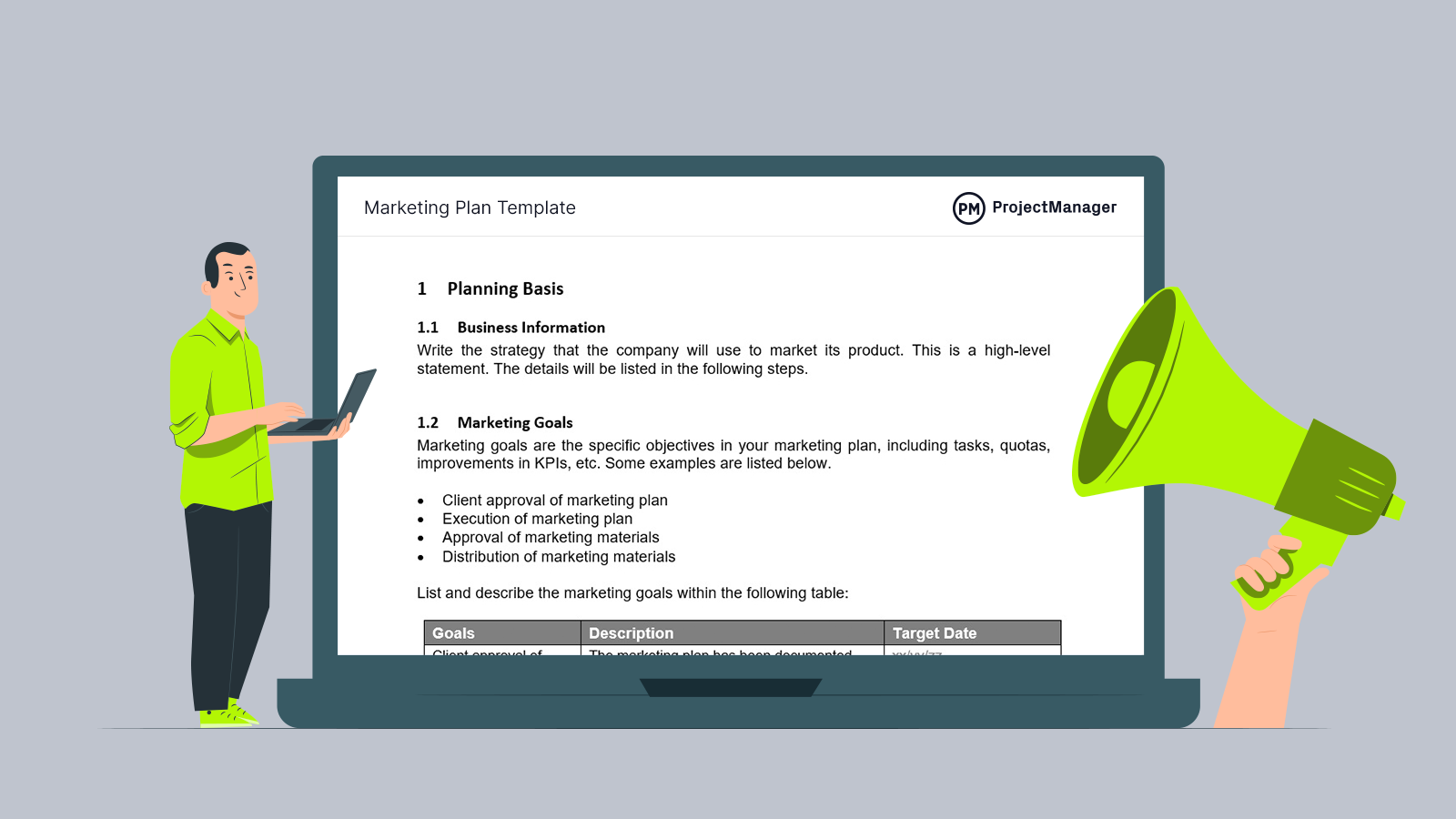
Get your free
Marketing Plan Template
Use this free Marketing Plan Template for Word to manage your projects better.
Marketing Management Key Elements
To better understand how marketing management is accomplished, it’s necessary to know the key concepts that make up the discipline. Here’s an overview of the elements that build the marketing framework of a business.
Marketing Mix
Marketing revolves around what’s called the four Ps:
- Product
- Price
- Place
- Promotion
The four Ps are the marketing mix that holds up any marketing plan. If you follow them, you combine the soft science of psychology with hard physical factors to influence customers. Psychological elements unearth what the customer wants and influence their buying habits to select your product or service. Physical factors make your product or service better, such as streamlining your channel of distribution or improving the product’s quality.
Marketing Strategy
A marketing strategy is a long-term plan that defines how a company will approach its customers, including the aspects of the marketing functions such as market research, branding, distribution channels, advertising and pricing. A marketing strategy is a high-level view that encompasses the marketing plan, budget and campaigns. It’s advisable to use a mix of pull and push marketing strategies.
Marketing Plan
A marketing plan is a document that outlines the overall marketing strategy of a company. It explains in further detail how that marketing strategy will be executed. It also includes the marketing budget that will cover the costs of these activities. Our marketing plan template is ideal to get started.
Marketing Budget
A marketing budget describes the amount of money needed to cover the marketing activities of a company. It’s important to do a thorough cost estimation of those activities such as advertising before defining a budget to avoid cost overruns in your marketing campaigns. Our marketing budget template is a great tool to kickstart the marketing budgeting process.
Marketing Campaign
A marketing campaign is a set of activities or tactics that go into a marketing plan. There can be different types of marketing campaigns with varying scopes and budgets. A marketing campaign can be developed to promote a corporation, brand or simply a product.
A marketing campaign can be made up of a mix of any of these marketing activities. These are just some examples of the marketing tactics you can use.
- Digital Marketing: The term digital marketing refers to an umbrella of activities such as content marketing, social media marketing, SEO, and SEM. These digital marketing areas rely on data analysis and metrics to gauge success.
- Paid Advertising: This is any advertising you pay for, such as print media or digital placement, which can include PPC (pay per click).
- Email Marketing: A component of digital marketing, email marketing, as the name suggests involves engaging potential customers by sending emails at scale and doing A/B testing.
- Account-based Marketing: Account-based marketing is a type of marketing strategy in which marketing and sales departments jointly identify high-value accounts to launch personalized marketing efforts.
- Cause Marketing: Link your good or service to an issue or social cause to resonate with your target audience.
- Relationship Marketing: Build a relationship with your customer and enhance those existing relationships to build and improve brand loyalty.
- Undercover Marketing: A stealth approach, where consumers aren’t aware that they’re being marketed to.
- Word of Mouth: One of the most important marketing strategies, but a hard one. That’s because it relies on people giving positive impressions of your good or service, which builds sales and loyalty.
- Internet Marketing: Create a content strategy to use the internet and other digital platforms to advertise your goods or services.
- Transactional Marketing: Use coupons, discounts and events to facilitate sales and attract your target audience through promotions.
- Diversity Marketing: When you have a wide range of consumers, you need to diversify your marketing in order to respect cultural and religious views.
Project management software can help you organize your research and build effective marketing plans. ProjectManager lets you plan and collaborate in multiple project views like the Gantt chart, task list, calendar or kanban board. Try it free today.
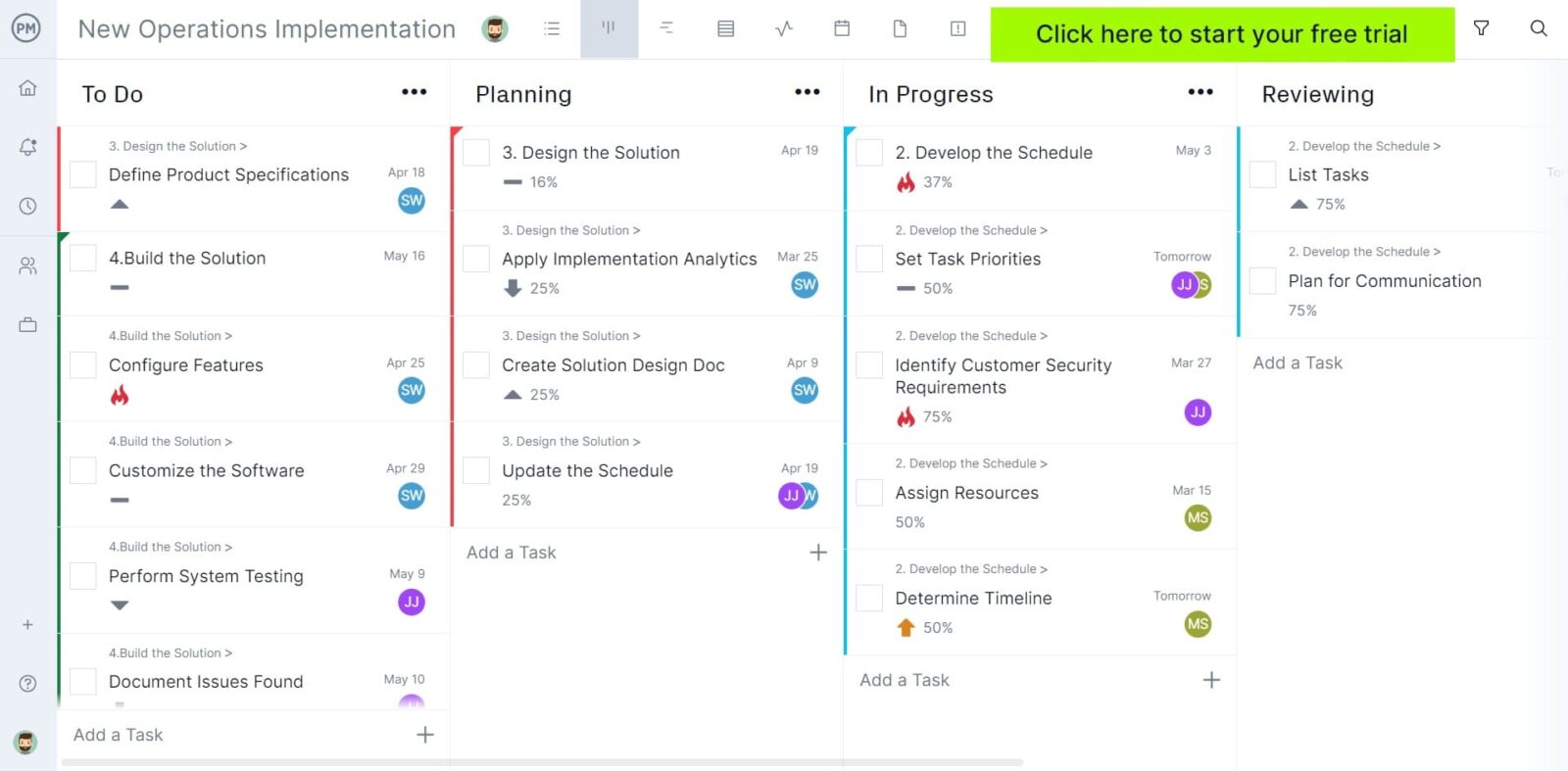
The 7 Marketing Management Functions
The seven marketing functions are the pillars of marketing management. That’s because these are seven key areas that group all marketing management activities. Handling all these seven areas can be overwhelming, that’s why it’s suggested to use project management tools for marketing.
1. Promotion
Refers to all the marketing activities that promote brand awareness. Promotion can be focused on a brand or a single product or service. There are many types of promotion such as digital advertising, content marketing, PR and events. Making a creative brief is a good way of putting together your promotion efforts.
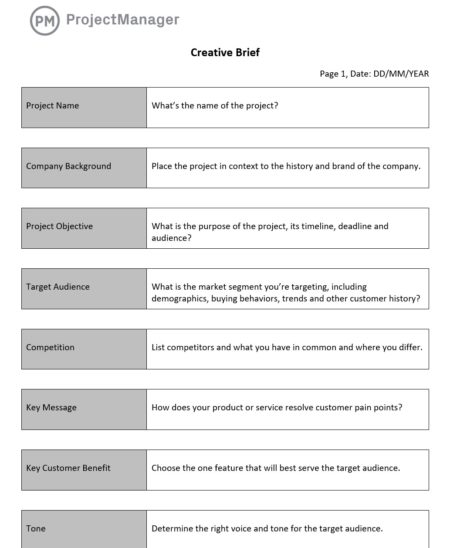
2. Selling
Marketing and sales are closely related. Typically, marketing departments build a marketing funnel strategy that generates leads and sales for an organization. It’s then important to keep a marketing calendar and customer relationship management (CRM) system in place to maintain profitable relationships with customers.
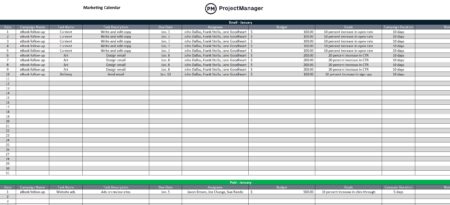
3. Product Management
Marketing management also involves working closely with product management departments. Both teams must give each other feedback to develop a product that meets both the company’s and customers’ requirements. Product development teams are concerned with the functional aspects of the product as well as keeping costs down, while marketing managers must provide guidance to develop products that are tailored to the target customer’s needs.
4. Pricing
Marketing management professionals must develop a pricing structure for a business. There are several factors involved in the pricing decision-making process such as demand planning, costs and the brand’s competitive landscape.
5. Market Research
Market research is the process of analyzing customer data such as demographic information to develop a marketing strategy that satisfies their needs. Market research will allow you to understand the buying behavior of your target audience, and from there, you can figure out what the most appropriate marketing strategy is to reach your target customers.
6. Financing & Budgeting
Securing financing, estimating costs and creating a marketing budget are important areas of marketing management. Without financing and budgeting, marketing strategies can’t be executed.
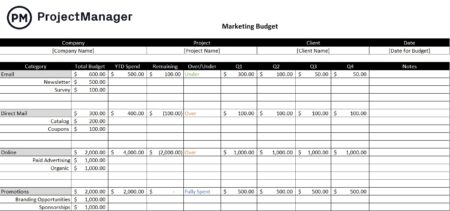
7. Distribution
Deciding which are the best distribution channels to sell your product is a critical part of marketing management. You can choose a brick-and-mortar location, online channels or a hybrid model.
Marketing Plan Template
This free marketing plan template for Word helps you define your target market, describe the marketing efforts of your team, set goals and establish KPIs to measure the success of your strategies.
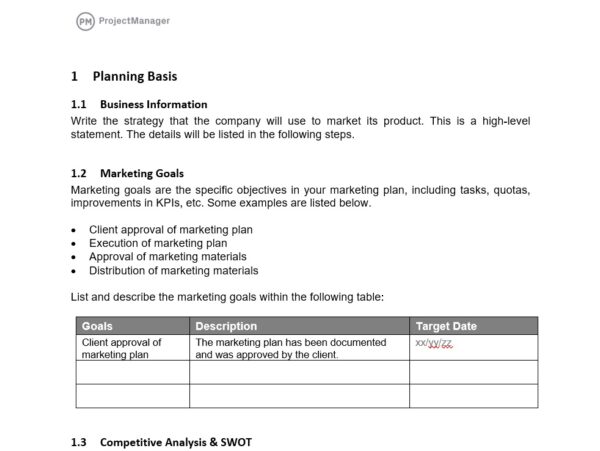
Marketing Management Roles
Now that we’ve learned about the elements that make up the marketing management discipline, let’s review two of the most important roles in marketing management, the marketing manager and director of marketing.
Marketing Manager
A marketing manager is the leader of a marketing department. It might be referred to as “head of marketing” or similar titles, but the responsibilities are essentially the same. A marketing manager is in charge of overseeing the campaigns and tactics that are taken to apply the marketing strategy that’s been defined by a company.
VP of Marketing
This role is mostly seen in larger companies. The VP of marketing is the liaison between the CMO or leadership team and the marketing, sales and other departments. Its main responsibility is to make sure the marketing strategy of the company is correctly applied throughout the organization.
Chief Marketing Officer (CMO)
A chief marketing officer (CMO) is an executive who’s responsible for developing a marketing strategy that achieves the business goals of an organization from a high-level view.To do so, they collaborate with other executives and multiple teams to understand what are the strengths, weaknesses, opportunities and threats of an organization.
Once the CMO and the leadership team define a marketing strategy, then the CMO will collaborate with the VP of marketing or marketing director to develop a marketing plan that’s actionable.
Why Is Marketing Management Important?
Some might feel dismissive about marketing. There’s a reason why marketing budgets are often the first to get cut when a company is in a financial downturn. If you’re honest with yourself, however, you’ll realize how marketing has influenced what you buy. In reality, marketing does work and advertising can be incredibly persuasive.
Of course, your organization isn’t the only one that knows this. Your competitors likely have marketing management processes in place and are looking to take your market share. That’s another reason why marketing management is important; you need to stay competitive. Complacency is the death knell for any business.
Marketing management is relevant to both small and large/established businesses. It can drive success by opening up avenues that best reach your customers. That’s how you grow sales. Plus, engaging positively with your audience is how you build a brand strategy. The data you collect allows you to analyze your target customers (and their buying habits) to tweak your marketing plan and make it even more effective.
Free Marketing Management Templates
Marketing management involves overseeing many activities at once. To help you with this process, we’ve created blogs, guides and free marketing templates like these.
- Creative Brief Template
- Marketing Budget Template
- Marketing Campaign Template
- Marketing Calendar Template
ProjectManager & Marketing Management
Marketing management involves creating and implementing a marketing plan. That means creating tasks, as well as monitoring and tracking the progress of your marketing strategy as it unfolds. ProjectManager is work management software that delivers the real-time data needed to make insightful decisions.
Keep Teams in the Loop
The marketing team answers to executives in the company, who want to stay updated on the campaign. Our tool has multiple project views that give managers and teams the tools they need to monitor their work. For example, ProjectManager’s Gantt charts turn marketing plans into a visual timeline, where everyone can see the progress. As the marketing plan is implemented, managers get real-time data.
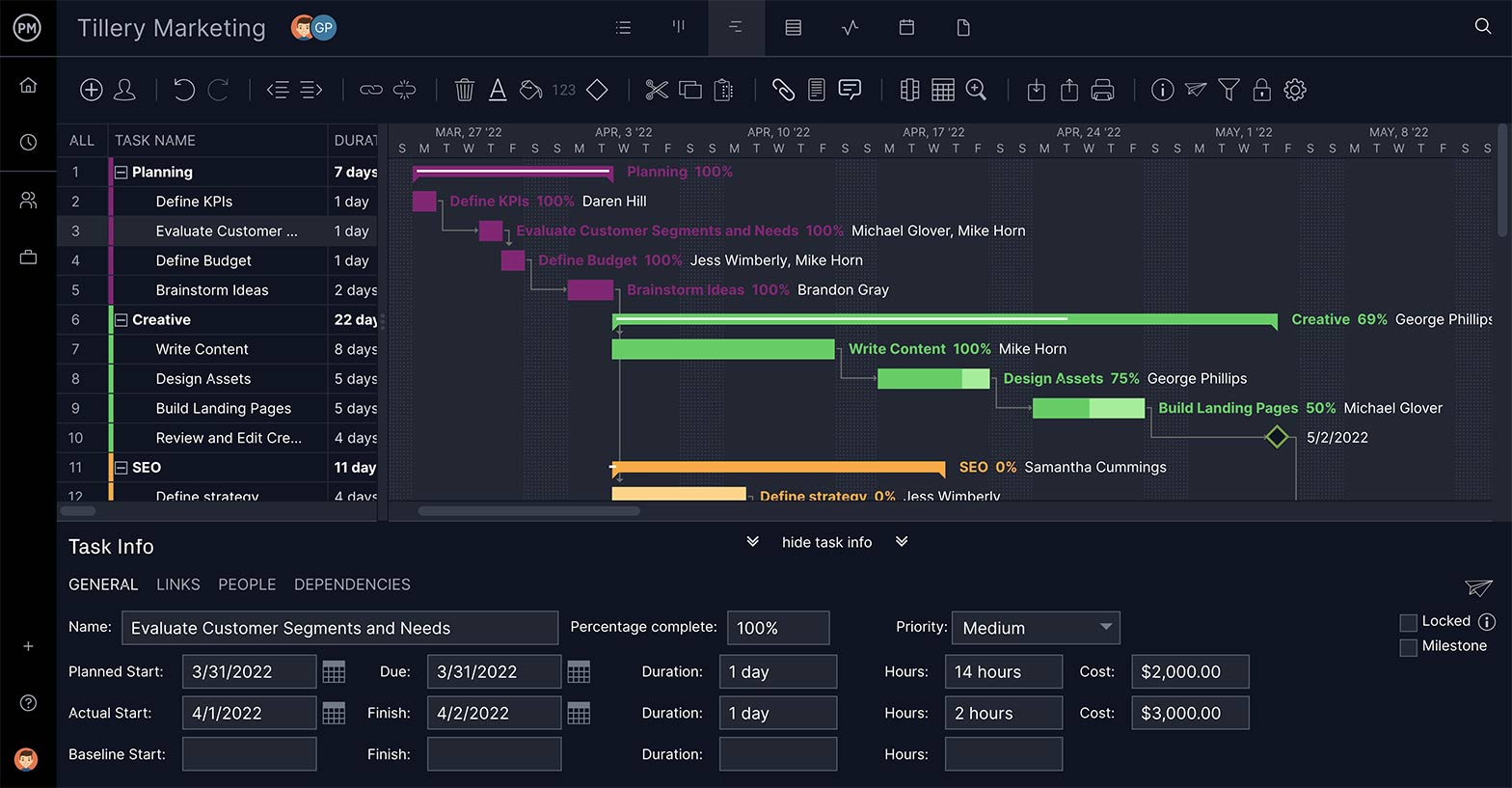
Monitor Progress in Real-Time
Use ProjectManager’s live dashboard to capture status updates and automatically calculate metrics, which are displayed in easy-to-read charts and graphs. For deeper insights, create one-click reports on time, cost and workload. They can be filtered to show only the data you want.

Manage Multiple Plans at Once
Most marketing pushes involve more than one campaign. ProjectManager’s portfolio management features give you an overview of all the projects you’re working on so you can find synergies and share resources to streamline costs. We help you plan, organize and execute your marketing management from start to finish.

ProjectManager is award-winning software that gives marketers the tools they need to manage their campaigns and advertising pushes. Automated notifications keep everyone on the same page, while our collaborative platform helps teams work better together. Get more out of your marketing strategies by trying ProjectManager free today.

